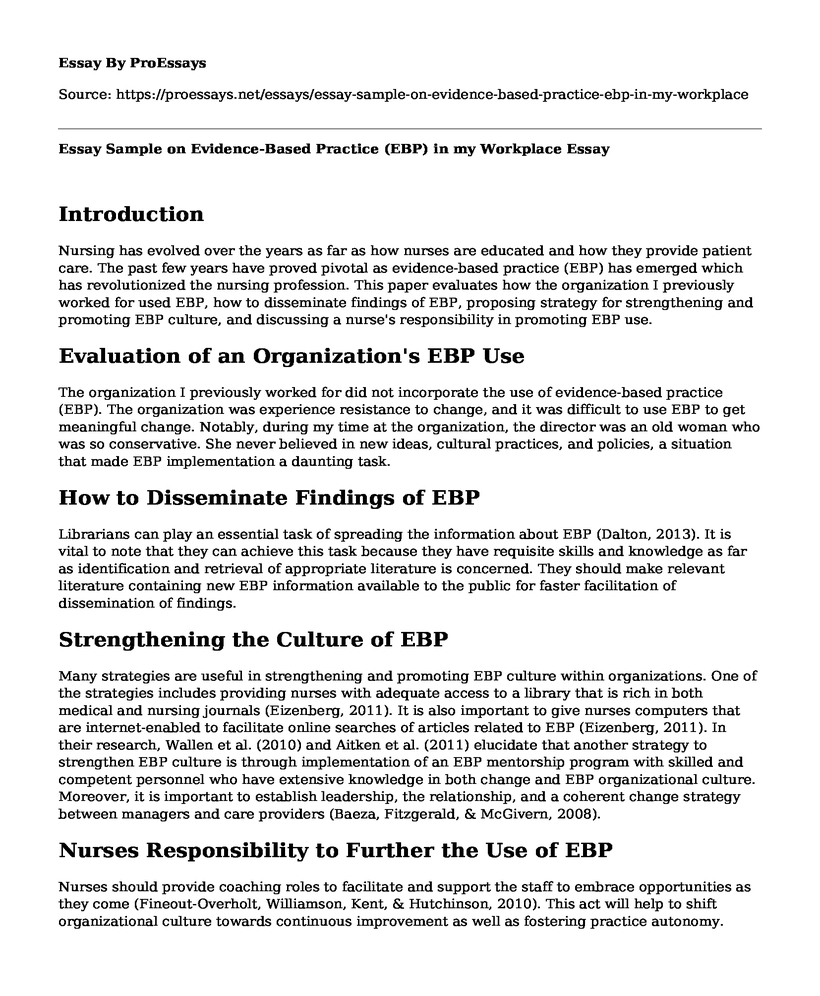Introduction
Nursing has evolved over the years as far as how nurses are educated and how they provide patient care. The past few years have proved pivotal as evidence-based practice (EBP) has emerged which has revolutionized the nursing profession. This paper evaluates how the organization I previously worked for used EBP, how to disseminate findings of EBP, proposing strategy for strengthening and promoting EBP culture, and discussing a nurse's responsibility in promoting EBP use.
Evaluation of an Organization's EBP Use
The organization I previously worked for did not incorporate the use of evidence-based practice (EBP). The organization was experience resistance to change, and it was difficult to use EBP to get meaningful change. Notably, during my time at the organization, the director was an old woman who was so conservative. She never believed in new ideas, cultural practices, and policies, a situation that made EBP implementation a daunting task.
How to Disseminate Findings of EBP
Librarians can play an essential task of spreading the information about EBP (Dalton, 2013). It is vital to note that they can achieve this task because they have requisite skills and knowledge as far as identification and retrieval of appropriate literature is concerned. They should make relevant literature containing new EBP information available to the public for faster facilitation of dissemination of findings.
Strengthening the Culture of EBP
Many strategies are useful in strengthening and promoting EBP culture within organizations. One of the strategies includes providing nurses with adequate access to a library that is rich in both medical and nursing journals (Eizenberg, 2011). It is also important to give nurses computers that are internet-enabled to facilitate online searches of articles related to EBP (Eizenberg, 2011). In their research, Wallen et al. (2010) and Aitken et al. (2011) elucidate that another strategy to strengthen EBP culture is through implementation of an EBP mentorship program with skilled and competent personnel who have extensive knowledge in both change and EBP organizational culture. Moreover, it is important to establish leadership, the relationship, and a coherent change strategy between managers and care providers (Baeza, Fitzgerald, & McGivern, 2008).
Nurses Responsibility to Further the Use of EBP
Nurses should provide coaching roles to facilitate and support the staff to embrace opportunities as they come (Fineout-Overholt, Williamson, Kent, & Hutchinson, 2010). This act will help to shift organizational culture towards continuous improvement as well as fostering practice autonomy. Consequently, it will help improve the patient outcome and nurse satisfaction, which is EBP's ultimate goal (Fineout-Overholt et al., 2010).
Conclusion
Evidence-based practice is an integral approach in nursing that ensures incorporation of clinical expertise, independent scientific research, and patient experiences. For this reason, it is prudent to strengthen EBP culture among nurses and other healthcare professionals. In this regard, nurses need to consider the latest healthcare research to determine the best patient care and treatment.
References
Aitken, L. M., Hackwood, B, Crouch, S., Clayton, S., West, N., Carney, D., & Jack, L. (2011). Creating an environment to implement and sustain evidence-based practice: A developmental process. Australian Critical Care, 24(4), 244-254.
Baeza, J. I., Fitzgerald, L., & McGivern, G. (2008). Change capacity: the route to service improvement in primary care. Quality in Primary Care, 16(6).
Dalton, M. (2013). Developing an evidence-based practice healthcare lens for the SCONUL Seven Pillars of Information Literacy model. Journal of Information Literacy.
Eizenberg, M. (2011). Implementation of evidencebased nursing practice: nurses' personal and professional factors?. Journal of advanced nursing, 67(1), 33-42.
Fineout-Overholt, E., Williamson, K. M., Kent, B., & Hutchinson, A. M. (2010). Teaching EBP: Strategies for achieving sustainable organizational change toward evidence-based practice. Worldviews on Evidence-Based Nursing, 7(1), 51-53.
Wallen, G. R., Mitchell, S. A., Melnyk, B., FineoutOverholt, E., MillerDavis, C., Yates, J., & Hastings, C. (2010). Implementing evidencebased practice: effectiveness of a structured multifaceted mentorship programme. Journal of advanced nursing, 66(12), 2761-2771.
Cite this page
Essay Sample on Evidence-Based Practice (EBP) in my Workplace. (2022, Jul 08). Retrieved from https://proessays.net/essays/essay-sample-on-evidence-based-practice-ebp-in-my-workplace
If you are the original author of this essay and no longer wish to have it published on the ProEssays website, please click below to request its removal:
- Management and Treatment of Elderly Prostate Cancer Men
- Cognitive Heart Failure (CHF) Paper Example
- Essay Sample on The Impact of Age on Cognition
- Skin Cancer Prevention Based on Sun Awareness Paper Example
- Radon: A Silent Killer With Life-Threatening Effects - Essay Sample
- Essay on Apicha Community Health Center: Providing Quality, Affordable Care to Vulnerable Communities
- Essay on 46% of US Adults Have Hypertension: Dash Diet to the Rescue







